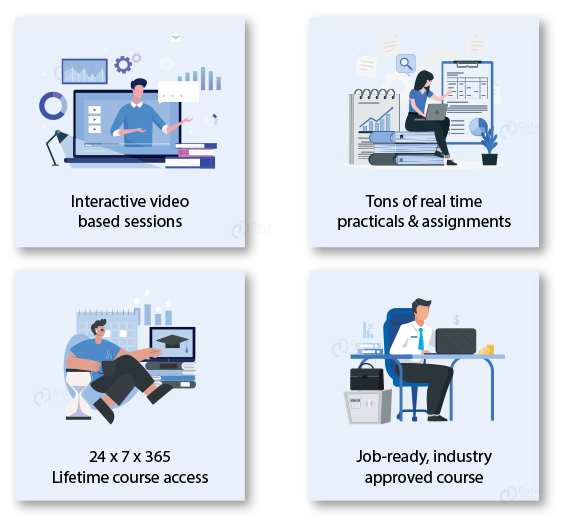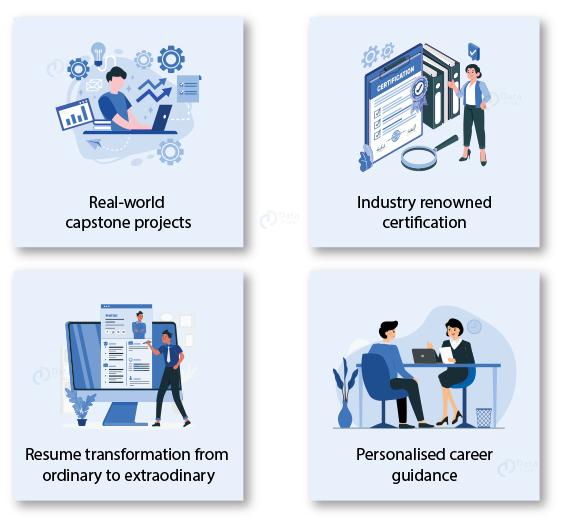Free Node.js Certification Course
 Developers can run server-side JavaScript code using Node.js, a robust and flexible open-source JavaScript runtime environment. The event-driven, non-blocking architecture of Node.js makes it ideal for creating scalable and effective network applications. Being able to create real-time web apps, APIs, and microservices has helped it become very well-liked since it acts as a seamless link between front-end and back-end development.
Developers can run server-side JavaScript code using Node.js, a robust and flexible open-source JavaScript runtime environment. The event-driven, non-blocking architecture of Node.js makes it ideal for creating scalable and effective network applications. Being able to create real-time web apps, APIs, and microservices has helped it become very well-liked since it acts as a seamless link between front-end and back-end development.
What will you take home from this Free Node.js Course?
- Self-paced video course
- 170+ hrs of study material, practicals, quizzes
- Acquire practical knowledge which industry needs
- Practical Node.js course with real-time case-studies
- Lifetime access with industry renowned certification
Why should you enroll in this Free Node.js course?
- Learn how to create scalable apps that can manage a high number of connections at once
- Develop techniques for handling exceptions and errors in Node.js applications
- Learn to use npm (Node Package Manager) effectively for managing dependencies and reusing code
- Learn how to quickly create web applications and RESTful APIs using the Express.js framework
- Be familiar with how to link Node.js programs to a variety of databases, including MongoDB and MySQL
- Acquire a firm understanding of the foundations of Node.js, including event-driven architecture and asynchronous programming
- Raise your earning potential and professional profile
- Get access to fresh content that reflects Node.js developments
- Upon successful completion of the course, you will be given a verifiable certificate
- Learn how to use JavaScript to create dependable server-side applications and APIs
- Learn MEAN/MERN prerequisite Stack which is quite need for JavaScript development on the whole stack
- Cover all necessary subjects at all levels, from beginner to expert
- Acquire practical experience by working on actual projects
- Gain knowledge from seasoned programmers with Node.js skills
- Participate in conversations, coding challenges, and quizzes to learn interactively
- Study at your own speed with constant access to the course materials
Node.js Course Objectives
The goal of our Node.js course is to give you the knowledge and practical experience necessary to become a skilled Node.js developer. Whether you’re a novice or an expert programmer, this Node.js course will take you from the fundamentals to more complex ideas, equipping you to create scalable and effective server-side JavaScript applications. You will obtain the skills necessary to succeed in the dynamic environment of contemporary web development through a combination of interactive teaching, real-world projects, and a caring learning community.
You can move through this Node.js course at your own pace thanks to our self-paced learning model. You can easily fit studying into your schedule by having access to course materials and assignments whenever you want.
The Node.js course is built to accomplish a number of important goals and provide participants a thorough understanding of Node.js and its real-world uses. These learning objectives lead students on a planned learning path that gives them the expertise needed to succeed in contemporary web development.
The goal of this Node.js course is to lay a solid foundation in the foundations of Node.js. Participants will gain knowledge of the fundamental ideas behind event-driven architecture, asynchronous programming, and the Node.js runtime environment. This information serves as the foundation for more complex topics and equips students with the tools they need to fully utilize Node.js’s capabilities in their work.
The main goals of the Node.js course are to give participants a thorough education that covers fundamental ideas, real-world applications, and advanced abilities. By completing these goals, students will be well-equipped to use Node.js to create high-performance, scalable, and real-time applications, placing themselves as knowledgeable programmers in the ever-changing web development industry.
By the end of this Node.js course, you’ll feel confident utilizing Node.js to create real-time applications, APIs, and server-side solutions, setting yourself up for lucrative prospects in the quickly developing field of web development.
Why should you learn Node.js?
Building incredibly responsive and real-time applications is where Node.js truly shines. Its event-driven, asynchronous architecture makes it possible to manage several connections without obstructing the progress of other tasks. Instantaneous updates are essential in applications like chat platforms, live streaming, and online gaming, so this is extremely important. You can develop these cutting-edge applications and offer flawless user experiences if you learn Node.js.
Additionally, Node.js developers are continually in demand on the job market. There is a growing demand for qualified developers who can create effective, scalable, and reliable server-side solutions as more and more major corporations choose Node.js to run their apps. Learning Node.js increases your versatility as a developer and expands your work options.
With Node.js knowledge, you can meet the rising demand for real-time and data-intensive apps by developing performant applications, collaborating across various development stacks, and becoming a highly sought-after professional. Node.js offers a path to a bright career in the quickly changing field of web development, whether you’re a front-end developer looking to broaden your skill set or an aspirant full-stack developer. One should definitely learn Node.js because-
- Leveraging JavaScript skills for both frontend and backend development.
- Efficiently handling concurrent connections with its non-blocking I/O model.
- Access to a rich ecosystem of open-source packages through npm.
- Building highly scalable and performant applications suitable for real-time interactions.
What is Node.js?
Developers can run JavaScript code on the server-side using Node.js, an open-source, cross-platform JavaScript runtime environment. Node.js makes it possible to run JavaScript code outside of the browser environment, as contrast to conventional JavaScript, which mostly runs in web browsers. The ability to use JavaScript for server-side scripting has changed web development by allowing programmers to create scalable and high-performance network applications.
The foundation of Node.js’s architecture is its event-driven, non-blocking nature. This indicates that Node.js uses an asynchronous method rather than the conventional synchronous programming model, in which tasks are carried out sequentially. Node.js can manage several connections at once without preventing the completion of other activities thanks to asynchronous programming.
A wide reservoir of open-source libraries and modules is made available by Node.js’s own package manager, npm (Node Package Manager), which developers can quickly and simply incorporate into their projects. Node.js has established itself as a vital component of the modern web development toolbox thanks to its capacity to expedite front-end and back-end development using a single language, enable real-time applications, and allow effective server-side programming.
What to do before you begin?
It’s advantageous to have a firm grasp of JavaScript foundations, such as variables, loops, functions, and object-oriented ideas, before delving into Node.js. Your move into Node.js’ event-driven architecture will be made easier by your familiarity with asynchronous programming and promises. A basic command-line understanding will also be helpful for running Node.js scripts and using npm to manage dependencies.
You might want to set up your development environment to ensure a seamless learning process.
- On your PC, install Node.js and npm by following the official installation instructions. The code editor or integrated development environment (IDE) of your choosing will serve as your primary tool for creating Node.js applications, so become familiar with it
- Additionally useful for version control and project collaboration is having a GitHub account. You’ll be ready to start your Node.js learning trip once you have these conditions met.
Who should go for this free Node.js course?
In this inevitable Information Technology juncture, the demand of basic Java frameworks is flooding every day. Node.js is one such perfect skill to learn which will highlight your value and make you an exclusive asset to this industry. Here are some of the prime reasons why you should go for this training.
For those looking to improve their coding abilities and increase their job options, node.js training has a wide range of advantages. With its event-driven, non-blocking architecture, Node.js gives students the tools they need to create extremely effective and scalable apps. This information is invaluable in fields that require real-time communication, such gaming, chat programs, and streaming services. Furthermore, the use of JavaScript by Node.js for both frontend and backend development speeds up learning for those already familiar with the language and facilitates a smoother transition.
For a wide spectrum of people looking to improve their programming skills and take use of the capabilities of server-side JavaScript, Node.js training is quite helpful. Developers with experience in frontend technologies can use this class to advance their backend development skills, enabling them to create full-stack applications with ease. Learning the asynchronous and event-driven programming paradigms of Node.js can provide aspiring web developers a competitive edge when building real-time, data-intensive, or highly dynamic apps.
- Develop a system that enables you to work on both front-end and back-end development using JavaScript to increase your developer versatility.
- There are many job prospects and potential raises for Node.js engineers due to their strong demand across industries.
- Developing real-time apps such as chat platforms and live data streaming will help you meet the increased demand for engaging user experiences.
- Master Node.js’s concurrent connection handling skills to ensure that your apps can scale to meet user expectations.
- You can build effective, high-performance apps with Node.js thanks to its event-driven architecture and non-blocking I/O model.
- Amateurs who wish to learn programming that are scalable and real-time, according to web developers
- Graduates with an interest in developing asynchronous networked apps.
- Professionals looking to advance their careers in the expanding Node.js development area.
By enrolling in our Node.js course, you can expect the following benefits:
Participants in this Node.js course will set off on a thorough learning journey that covers the foundational ideas, cutting-edge methods, and real-world uses of Node.js. Participants will learn the fundamentals of Node.js’s event-driven design, asynchronous programming, and the underlying runtime environment before diving deep into these topics.
As the course goes on, students will develop the skills necessary for contemporary web development by learning how to design server-side apps, make RESTful APIs, and integrate databases. Participants will be given the opportunity to build real-time apps like chat platforms through practical projects, which will improve their ability to provide responsive and dynamic user experiences. Participants will leave the course with the knowledge necessary to design scalable apps, put error-handling techniques into practice, and effectively use the Express.js framework for web development.
Participants who successfully complete this Node.js course will be well-equipped to contribute to server-side development projects, produce high-performance apps, and make the most of Node.js’s capabilities to suit the needs of contemporary web development.
- Develop your ability as a developer by learning how to use JavaScript to create both front-end and back-end applications.
- There are many career prospects for Node.js developers because of their high demand across industries.
- Applications having real-time capabilities, such chat platforms and live data streaming, should be created.
- The ability of Node.js to manage a large number of connections at once for scalable applications.
- Use the event-driven architecture provided by Node.js for effective, high-performance coding.
- Gain proficiency in full-stack development by learning how to work on both the front-end and back-end of a project.
- Participate in cutting-edge initiatives utilizing IoT and real-time data to increase your chances of innovation.
Jobs after Learning this Node.js Course
If you are thinking of joining this course, then you are doing yourself a huge favour. This Node.js course is exclusively made not just to upgrade your skills but to have you land over umpteen number of astounding job opportunities.
As discussed above, Node.js is an eminent part of web development and opens up to various advantageous scopes. If you are considering a career and that too a prosperous one, this you are at the right spot. Node.js has a lot to offer and the job opportunities are enormous. Let’s find out.
- API Developer: RESTful APIs are created and maintained by API developers using Node.js, allowing for communication across various software programs and services.
- Developer of Real-Time Applications: Node.js is ideally suited for creating platforms for online games, collaborative tools, and chat applications. You can work on tasks that call for immediate data updates and interactions if you have this competence.
- Web application developer: Node.js may be used to build a variety of web apps, including social networking sites and e-commerce systems. You will use Node.js as a web app developer to create the server-side elements of these applications.
- Developer of Node.js: As a Node.js developer, you’ll focus on constructing server-side applications. You’ll work on creating scalable and effective real-time applications, APIs, and backend systems that can manage numerous connections at once.
- Full-stack Developer: Node.js is a key technology for full-stack development, according to full-stack developers. You may work on the front-end and back-end of web apps if you are familiar with Node.js, which makes you a valuable asset to development teams.
- DevOps Engineer: Node.js may be used to automate processes, create deployment scripts, and manage server infrastructure, according to a DevOps engineer. You can use Node.js as a DevOps engineer to simplify development processes and guarantee successful deployments.
- Startup Developer: Due to its effectiveness and scalability, Node.js is favored by many startups. As a Node.js developer, you may be able to work on cutting-edge projects and significantly influence the direction the product takes by joining a company.
- Freelance Developer: If you are proficient in Node.js, you can work as a freelance developer, designing bespoke software for clients, developing APIs, or making contributions to open-source initiatives.
- Mobile App Backend Developer: Node.js can also be used as the backend technology for mobile applications, according to backend developers for mobile apps. You will utilize Node.js as a mobile app backend developer to create the backend logic and APIs that enable your mobile apps.
Our students are working in leading organizations

Online Node.js Free Training Course Curriculum
- Node HTTP Module
- Installing Nodemon
- Responding with data
- HTTP status code
- RESTful API’s and HTTP methods
- Resources and specs of project
- Git, dotenv and express server
- Creating routes and responses in express
- Operating express router
- Creating controller methods
- Working with Middleware
- Postman environment and collections
- MongoDB atlas and compass setup
- Operating to database with Mongoose
- Colours in console
- Creating model
- Creating bootcamp – POST
- Fetching bootcamp – GET
- Updating and deleting bootcamps – PUT and DELETE
- Custom error response class
- Async and await middleware
- Mongoose middleware and slugify
- GeoJson location and Geocoder hook Mapquest API
- Database seeder for bootcamp
- Geospatial query for bootcamps
- Advanced filtering
- Pagination
- Populate, virtuals and cascade delete
- Advance results with middleware
- Authentication, users and permissions
- User register and encrypting passwords
- Sending JWT in a cookie
- Storing token in Postman
- Bootcamp ownership
- Generate token – send email
- Admin users CRUD
- Logout to clear token cookie
- Prevent NoSQL injection and sanitize data
- XSS protection and security headers
- Rate limiting, HPP and CORS
- Documention with postman and docgen
- Digital ocean droptlet and server log in
- Prepare and push to Github
- Clone repo on server
- PM2 process manager setup
- NGINX reverse proxy setup
- Domain SSL and wrap up
Features of Node.js Free Course


